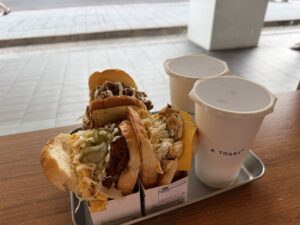Saturday, October 12, 2024
Taiwan loves cute things, and, even though I’m not an afficiando of cute, per se, there’s a certain charm to how enthusiastically they throw themselves at it.
For days now, we’ve been walking past a breakfast/brunch place called “A Toast.” Its logo is a cute little alligator poking its head out from behind a sandwich.
In Taiwan, this could mean one of two things: They thought it was cute, or they serve alligator sandwiches.
A quick search online suggested to me that they just thought it was cute. As it was Saturday, we arranged to meet Melz there for breakfast. I had a chicken sandwich, Melz had a pork chop sandwich, and Chuwan had a beef sandwich. They were all pretty good. Would eat there again. No alligator was to be found on the menu.
Tomorrow will be a circus (more on that tomorrow) so today Chuwan wanted to spend most of the day with her parents, leaving Melz and me to our own devices in the afternoon.
One thing Chuwan has been promising to do is make spaghetti sauce. We have an awesome spaghetti sauce recipe (not a family secret, just one we once found online and adopted as our own) and Chuwan’s brother, in particular, has been asking for it to be made.
The thing is, the ingredients for spaghetti sauce aren’t all common grocery store items like they are back home. The local supermarkets, including the little Carrefour Market, didn’t have what she needed, so we opted for a trip to a full-sized Carrefour.
Carrefour is a French store chain and in the Battle to Conquer the Taiwan Market, Carrefour won out over most of the competition. Their big stores have a lot of imported and harder-to-find items. They just aren’t necessarily convenient to where we are staying.
We decided to use the YouBikes to ride to the store and get “rare” items like tomato paste, Italian sausage, and parsley (plus a few others). This time, I managed to score an eBike. Most YouBikes are yellow acoustic models, but there are a few orange electric ones. They don’t seem to be too popular, but they apparently cost twice as much to rent.
Apparently, the fees are considered exorbitant because the eBikes cost 20NTD per half hour to rent. That’s $0.62/half hour or $1.24/hour. The acoustic bikes are only 10NTD per half hour.
Both models are three-speed, with adjustable seats—although the handlebars do not adjust and can be a bit low if you’ve got the seat at the max level, making the bikes a little unsteady. They’ve got very low step through frames, and all have a front basket, and a built in locking mechanism for securing the bike while you go into a store. I’ve never tested the locking mechanism because it’s always been easy enough just to return the bike at a dock and stop the meter from running.
The eBike does not have adjustable PAS levels, but it supplies just enough juice to pick up speed quickly. I couldn’t test it at flat-out speed because there is nowhere safe to try that; however, it easily picked up to 20kph.
We rode the bikes up to Carrefour, and did some shopping. We found “British-style” Italian sausage, wich sounds like an oxymoron, and all of the ingredients except parsley. We also discovered that Carrefour stocks Dr. Pepper, which is annoyingly rare in Taiwan. We discovered they stocked it, not that they actually had it in stock.
Chuwan’s spaghetti sauce would go ahead today, with British Italian sausage and no parsley.
While Chuwan (voluntarily) slaved in the kitchen, Melz and I decided it was time for more pizza for lunch. On my last two trips to Taiwan there was a pizza place called Xiao NiuYue. (Little New York)
(Sorry, in an earlier post I attempted to use Chinese characters and my WordPress install rejected it out of hand. The fix was something that I wasn’t willing to undertake while on vacation, so we’re stuck with Pinyin for now.).
Little New York was a small hole-in-the-wall pizza place that made a credible effort to recreate New York-style pizza in Taiwan. (Remember what I said earlier about the ingredients for spaghetti sauce?) Now, there appear to be two locations for Little New York, which seems a positive development. We went to the “new” one.
The new location feels much larger than the old one and more upscale, as is often the case when a restaurant grows beyond its humble beginnings. We arrived for a very early lunch at a nice but mostly empty restaurant. Maybe 20% of the tables had customers.
We were promptly greeted by an employee who asked us the nearly universally-asked question of “ji wei?” (“How many people?”) to which Melz… record scratch… she actually said, “you ding wei ma?”
Melz was reduced to an ignorant “ummmm” in response (as was I.) The employee seeing our discomfort switched to near-perfect English, “Do you have a reservation?”
(A reservation?!? Damn, this place has gone upmarket.)
Let’s digress for a moment because I love a good digression!
For better or worse, I have been using Duolingo to study Mandarin. It’s far from perfect, starting with their insistence on only using Simplified Chinese Characters, as opposed to the Traditional ones used in Taiwan. I completed the entire course from beginning to end, which took a very long time, partially because of a lack of dedication and partially because they kept changing the damned app along the way.
Many of the lessons bear no resemblance to any realistic situation I’ll ever be in, but you learn the patterns and the grammar.
One such lesson is making/breaking reservations in a restaurant. I know those lessons backwards and forwards despite the fact that I don’t go to restaurants that require reservation (as a general, but not hard and fast rule.)
And here’s the damned thing about learning Mandarin, at least for me, this employee spoke only four clear words, two of which I do always know when I hear them (“you” for “to have” and “ma” to indicate this is a question). The other two words (“ding wei”), which I’ve passed countless tests/quizzes on, in this very context, I also know, and yet… “derrrrrr” was what my brain did.
It’s so damned frustrating!
Melz hasn’t been taught “ding wei” yet, so that’s their (legit) excuse.
From this point forward, our server spoke to us in English. Nonetheless, we still had to do the damned QR code ordering.
I used this opportunity to explore an idea that’s been nagging me. The internationalization of code has become much more common. Could it be that these online menus might support alternate languages? Scrolling far to the bottom of the page, I was rewarded with a choice between Chinese and English.
It was like magic.
Actually, it was like a really crap magic trick.
In Chinese mode, the page had tabs across the top, labeled in Mandarin. In each tab, names of menu items, followed by a short paragraph describing the item.
In English, the tabs and the names of the menu items were now in English, but the description of the item remained in Mandarin. Now you might think, “What’s the problem? If you know the name, you know what it is!”
Tell me, wise one, what’s a Hell’s Kitchen Pizza? Or a Broadway? Or an Ellis Island?
Melz, meanwhile, was muddling through ordering us a pepperoni pizza. (That’s a New Yorker, BTW.) But as as it seems with all restaurant orders in Taiwan, there were lots of questions after they’d picked the item. What we got was a half New Yorker, half cheese pizza. We still don’t know how that happened.
We also got some garlic knots. It was all very good. I’m rooting for Pizza Rock as the up-and-coming challenger, and I enjoyed their pizza the other day, but Little New York is better. It’s a decent pizza, and I don’t mean “considering it’s in Taiwan.”
Let me tell you a little aside about receipts in Taiwan. Little food stall aside, they’re really aggressive about giving receipts at stores. These aren’t just any receipts; they’re tied into a government receipt-accounting system. If you get a receipt, the tax has been recorded and reported to the government. Many years back, Taiwan implemented what I consider to be a clever system to prevent under-the-table sales. Every receipt is essentially a lottery ticket. Periodically, the government holds a drawing, and, if you’re holding the receipt drawn, you get… some portion(?) of your purchase price back as a prize.
This system means people want their receipts, and vendors are obligated to produce them (and therefore collect taxes.) (Certain street vendors do not issue receipts, and I do not know why they are exempt. Probably because it doesn’t make much sense to have a receipt-generating computer on a food cart.)
I love this system, but it means you collect a lot of paper receipts, which isn’t very green. Sometime since my last visit, they’ve implemented some form of App-based eReceipt system, and if you speak Mandarin, they’ll ask you if you want an eReceipt. Luckily, they just look at my white face, hand me a paper receipt, and be done with it.
Usually.
The staff at Little New York spoke excellent English, but with an accent.
As I paid the bill, the cashier asked me, in English, if I wanted an eReceipt, but the way she pronounced it, I didn’t get the “e” part because it just sounded like an oddly-accented pronunciation of “receipt,” so I said, “yes” and the dance began, because then she started asking for information I didn’t have or understand.
We sorted it out, but we were both flustered, and she didn’t give me my 400NTD change. (I did get it, but there was more embarrassment as I pointed out the error.)
Min Yao was nearby on the map, so I convinced Melz we should go there.
Taiwan is dominated by Japanese department stores like Sogo, Shin Kong Mitsukoshi, and Dayeh Takashimaya. To my knowledge, the only local Taiwanese department store is Min Yao. For a variety of reasons, I haven’t been to Min Yao for the last few trips.
Min Yao was a gutted shell of what it used to be.
The Japanese department stores truly are departmentalized. There are brand shops within them; you cannot just take an item from one department to another and pay for it there. (OK, maybe you can in 2024 since we didn’t buy anything this trip to test that, but historically, you cannot because they are different entities.) Even still, the stores are still branded as the name of the department store. It feels very much like the departments are either run by the store or sublet to a third party as their agent.
Min Yao used to be like that, too, but it was a shell of its former self. In the multi-story building, only one floor was branded as Min Yao, and the rest were different stores like Uniqlo or Daiso. Melz found stuff to buy, anyway, but I felt a little sense of loss for the once-plucky contender against the Japanese mega-department store forces.
I think my back is slowly getting better. I’ve been able to go longer each day before having to rely on painkillers, but nonetheless, by this point, my back was done. I went home for a nap in anticipation of the evening’s spaghetti dinner.
Here’s another thing you need to know about Taiwan: Table salt isn’t a thing. If you want salt on your french fries, even at McDonald’s, you’d better bring your own. I’m sure this is a healthy thing for them (perhaps offset by soy sauce) but it can mean even prepared items can be less salty.
Chuwan made her spaghetti sauce, following the exact recipe she always does, with two exceptions. We could not obtain parsley flakes, so the recipe was a teaspoon shy of parsley, and the Italian sausage was “British-style” (whatever that means) and made in Taiwan. (So, not even actually British.)
Where am I leading with this? The sauce didn’t taste right. Whether it was the sausage, the lack of parsley, or any of the other ingredients that might not be the same as back home, the sauce just wasn’t right. (My money is on the sausage.)
Melz and I spotted it immediately, but the family, not knowing what it was supposed to taste like, were in ignorance. Melz grabbed the salt from the kitchen, and we tried adding it to our food, and it helped a lot. What was really strange was when my brother-in-law came over and took the salt and said, “it could use some salt.”
That was not a phrase I ever expected a Taiwanese person to ever say.
On a lighter note, despite my wife’s great efforts in getting the ingredients, she forgot to consider the dining environment at her parents’ home. They don’t own forks! It was spaghetti with chopsticks!
Actually, they did own a fork – a tiny dessert fork – and I used it just stage the photo op.
Now we come to the tricky part of the evening. My wife made plans to go to the Ningxia night market with her friend Nora. Several times during the day she asked both Melz and me if we wanted to go along. For my part, the answer each time was, “It will depend on how my back feels.”
I hadn’t been to a night market this trip and wanted to go, especially since it was one I’d not been to, but walking a crowded, slow-moving night market can be a strain on my back at the best of times.
After dinner, Chuwan asked us one last time, and we decided to go.
“You don’t have to go if you don’t want to,” she immediately says.
Perhaps I should have picked up the undercurrent in that statement, but after asking us several times, neither of us caught that she didn’t actually want us to go with them.
We go to the night market, and meet up with her friend at a nearby MRT station, and head out on foot towards the market.
Night markets have tons of portable, walk-and-go-type foods. It’s common for people to snack their way from one end to the other. Some restaurants own the shops along the sides that offer sit-down dining, and sometimes, there will be a collection of plastic tables and chairs for people to sit and eat messier foods.
We didn’t actually make it to the night market before the problems began. Chuwan and Nora immediately hopped into a line at a storefront order window for something. Melz and I didn’t know what, and they didn’t bother to tell us.
“You want to stand in line with us?”
“No, we’ll just go sit over there and wait.” and we did. And they were in line for a long time, and right after we saw them ordering, they disappeared on us. We were fucking fuming. Where the hell had they gone?
In a bit, we get a text that says, “Are you coming?”
Our conclusion: They walked away from us and didn’t even try to catch our attention. My mood is rapidly going from bad to worse.

There are very few public garbage cans in Taiwan. Near night markets, this is what happens.
But I’ve got faith in my wife (but not her friend), and I just couldn’t believe she’d completely ditch us. It occurred to me that sometimes, these little storefronts that look like their to-go only have a small back area for eating, not always obvious. Sure enough, I found them sitting in the back of a cramped hole in the wall eating whatever it was they’d bought. I didn’t go in, but went back to report to Melz, who thought this rude.
I’ve give Melz this: They sent a message to Chuwan saying, “Are you eating at the place?!?!? Well that’s rude. I think you owe us some spending money for ditching us.” I’m more of a quiet-anger person in situations like this.
Melz went in and got 1000NTD from Chuwan, and we left them and went into the night market, which turned out to be disinteresting, and we went home.
I’m not making any excuses because this was unacceptable behavior under any circumstances. Still, afterward, we learned that Chuwan had apparently sent the message “Are you coming?” to have us follow them into the dining area and sit with them. However, what they were doing was poorly communicated, and we were having internet issues, so the message wasn’t sent until they had already gone inside, so it came across to both of us in the worst possible way. It’s the only time in 26 years of marriage that I remember being lividly angry at my wife.
Earlier in the day, when we were at Carrefour, when we’d found the British-style Italian Sausage, it was in a red English phone booth-styled freezer, along with a number of other frozen “British” products with the Churchill brand. Amongst those was a beef and onion pie. Our Airbnb has a toaster oven, so I thought I’d give it a shot.
(It pains me to say you virtually can’t get a beef and onion pie in Phoenix.)
I decided I’d give it a try tonight. First snag: The recipe calls for cooking the pie at 180ºC for 45 minutes. I hadn’t previously looked at the toaster oven, and it was now that I discovered that it didn’t operate via temperature control. It was controlled by wattage. There were four different wattages, and each one operated different heating elements. For example, the highest setting operated both top and bottom elements, and the lowest, only the bottom.
None of that information was helpful at figuring out what setting I needed to use to cook the pie.
Sixty minutes of cooking later, and it didn’t turn out great, but I got the filling heated, so I ate it. It did not taste like a beef and onion pie. It tasted very much onion, and it tasted like something else I’ve eaten in Taiwan, but I couldn’t pin it down.
But not a beef and onion pie.
Much later, when Chuwan returned, I had cooled down a lot, and expressed Melz’ and my upset over her behavior. She was oblivious. She said, “I told you didn’t need to come. I thought you got the idea.”
“You invited us several times, and Melz and I thought you wanted us to go.”
We’re good. It’s in the past, but it is a lesson in better communication.



